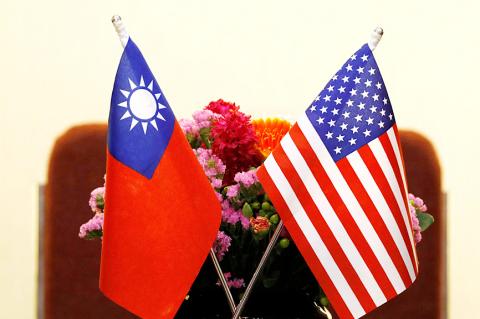The Ministry of Foreign Affairs yesterday thanked the US Senate for passing the National Defense Authorization Act (NDAA) for fiscal year 2020, which requires the Pentagon to report Chinese interference in Taiwan’s elections and create plans to boost Taiwan-US cybersecurity cooperation.
After the Democrat-controlled US House of Representatives approved the bill 377-48 on Wednesday last week, the Republican-led Senate on Tuesday passed it 86-8.
The legislation has been forwarded to the White House, with US President Donald Trump expected to sign it into law.

Photo: Tyrone Siu, Reuters
Article 5513 of the act requires the US director of national intelligence to deliver a report on Beijing’s interference or disruption campaigns targeting Taiwan’s elections and US responses to such campaigns within 45 days of an election in Taiwan.
The act also requires the US secretary of defense to submit a report on establishing a high-level and interagency US-Taiwan group to tackle new cybersecurity issues within 180 days of the act taking effect.
The Pentagon and the US Department of State would also be required to present a report within 180 days of the act’s implementation on the US’ Taiwan Relations Act; whether the Chinese government threatens Taiwan’s security, social order and economy; whether Beijing is changing the cross-strait military balance; and Taiwan’s expectation to determine its future via peaceful means.
Taiwan-US cooperation on cybersecurity is listed for the first time in the act, which also supports Taiwan’s resolve to bolster its self-defense capabilities and an increase in bilateral military exchanges, ministry spokeswoman Joanne Ou (歐江安) said in a statement yesterday.
The ministry thanked the US for again demonstrating its firm support for Taiwan-US military cooperation, and for its concern about Taiwan’s democracy and freedom, she said.
The legislation provides a total of US$738 billion in base discretionary funding, as well as US$5.3 billion in emergency disaster relief funding, US Senator James Inhofe, chairman of the US Senate Committee on Armed Services, said in a news release on Tuesday.
It includes landmark reforms for privatized military housing, establishes a US Space Force and ensures that US troops receive their largest pay raise (3.1 percent) in a decade, he said.
“It also sends a strong message to our allies and our adversaries, especially Russia and China. America is the leader of the free world, in large part because we are able to defend our values. This NDAA makes sure we keep it that way,” Inhofe said on Facebook.

Taiwan is gearing up to celebrate the New Year at events across the country, headlined by the annual countdown and Taipei 101 fireworks display at midnight. Many of the events are to be livesteamed online. See below for lineups and links: Taipei Taipei’s New Year’s Party 2026 is to begin at 7pm and run until 1am, with the theme “Sailing to the Future.” South Korean girl group KARA is headlining the concert at Taipei City Hall Plaza, with additional performances by Amber An (安心亞), Nick Chou (周湯豪), hip-hop trio Nine One One (玖壹壹), Bii (畢書盡), girl group Genblue (幻藍小熊) and more. The festivities are to

Auckland rang in 2026 with a downtown fireworks display launched from New Zealand’s tallest structure, Sky Tower, making it the first major city to greet the new year at a celebration dampened by rain, while crowds in Taipei braved the elements to watch Taipei 101’s display. South Pacific countries are the first to bid farewell to 2025. Clocks struck midnight in Auckland, with a population of 1.7 million, 18 hours before the famous ball was to drop in New York’s Times Square. The five-minute display involved 3,500 fireworks launched from the 240m Sky Tower. Smaller community events were canceled across New Zealand’s

AFTERMATH: The Taipei City Government said it received 39 minor incident reports including gas leaks, water leaks and outages, and a damaged traffic signal A magnitude 7.0 earthquake struck off Taiwan’s northeastern coast late on Saturday, producing only two major aftershocks as of yesterday noon, the Central Weather Administration (CWA) said. The limited aftershocks contrast with last year’s major earthquake in Hualien County, as Saturday’s earthquake occurred at a greater depth in a subduction zone. Saturday’s earthquake struck at 11:05pm, with its hypocenter about 32.3km east of Yilan County Hall, at a depth of 72.8km. Shaking was felt in 17 administrative regions north of Tainan and in eastern Taiwan, reaching intensity level 4 on Taiwan’s seven-tier seismic scale, the CWA said. In Hualien, the

‘IRRESPONSIBLE’: Beijing’s constant disruption of the ‘status quo’ in the Taiwan Strait has damaged peace, stability and security in the Indo-Pacific region, MOFA said The Presidential Office yesterday condemned China’s launch of another military drill around Taiwan, saying such actions are a “unilateral provocation” that destabilizes regional peace and stability. China should immediately stop the irresponsible and provocative actions, Presidential Office spokeswoman Karen Kuo (郭雅慧) said, after the Chinese People’s Liberation Army (PLA) yesterday announced the start of a new round of joint exercises around Taiwan by the army, navy and air force, which it said were approaching “from different directions.” Code-named “Justice Mission 2025,” the exercises would be conducted in the Taiwan Strait and in areas north, southwest, southeast and east of Taiwan